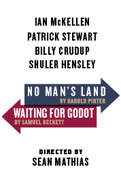Godot and No Man’s Land Director Sean Mathias on How Broadway Audiences Made His ‘American Dream’ Come True
About the author
Sean Mathias began his wide-ranging theatrical career as an actor and playwright before establishing himself as an in-demand director. A Tony nominee for Indiscretions, Mathias has helmed a London revival and film version of Martin Sherman’s Bent, Company at the Kennedy Center’s Sondheim Celebration, A Little Night Music at the National Theatre and Breakfast at Tiffany’s, which won a 2013 Broadway.com Audience Choice Award for Favorite New Play. The versatile director is currently represented on Broadway with hit productions of Samuel Beckett’s Waiting for Godot and Harold Pinter’s No Man’s Land, running in rep with the dream cast of Ian McKellen, Patrick Stewart, Billy Crudup and Shuler Hensley. For Broadway.com, Mathias writes about the challenge of bringing two enigmatic modern classics to life for a new generation, and how a key ingredient—the audience—transformed the experience for the actors.
![]()
Five years ago, after a final run-through of Waiting For Godot, I was giving notes in a South London rehearsal room before setting off on a short tour, prior to opening the play in the West End. At the end of the notes session, I faced a sea of gloomy and depressed faces, including those of Ian McKellen and Patrick Stewart.
Waiting for Godot is not an easy play to discover. It is a play that makes us face our own fragile existence. And what is worse, it makes us face our daily routine in all its banality.
The first week on tour did little to abate the misery that the play, my production and the actors’ performances were generating. But miraculously, after two or three shows, the unbearable clouds started to lift, the audiences’ enthusiasm started to infect, and the actors once again started to trust their director. Like any play, the transformation from studio to stage can be immense. With Godot, that much-needed element of audience proved to be a greater facet than I could ever have imagined.
Maybe it is this very factor that has led us to Broadway, and to share the production with New York and American audiences. Their sheer delight in the work, their extrovert response to the production, their absolute love of theater makes every show a new and fresh experience. Maybe the despair that the play examines enables the joy that the play releases to be so much the bolder, so much the greater. And the presence of two brilliant and completely inventive American actors, Billy Crudup and Shuler Hensley, joining Ian and Patrick in the cast has made the whole adventure an unforgettable one. An American dream come true.
The adventure really took off when we started to rehearse Harold Pinter’s No Man’s Land to debut at Berkeley Rep last summer. To watch my company of four create Pinter’s characters, knowing that within weeks they would morph into Beckettian creatures, brought excitement—most days. Then there were the other days when I faced a sea of gloomy faces once more.
Like Beckett, Pinter isn’t saying what he necessarily means or meaning what you might like to believe. Like Godot, No Man’s Land is a game of memory, of time elapsed and elapsing; dealing with things abstracted, ideas and not realities. Actors like to know who they are playing, what they are thinking, feeling, meaning, intending at any one time. These two plays require huge leaps of faith and tremendous courage. One is asked to leave the literal self behind and dive into a world of the “other.”
During the rehearsal period there is no such thing as a secure actor and no room for an insecure director. Paradoxically, the greater the talent and the bigger the range of experience, the larger the space for doubt to gestate. But Pinter’s play had led us to its core via the style. Once at that core we held our breath and hoped for the right response. How gratifying, then, to arrive in Northern California and be welcomed by the intelligent, humorous, progressive audiences at Berkeley Rep. It was there we forged our confidence before we joined the two plays together and presented them on Broadway.
Much of my earlier work as a director was produced at the UK’s National Theatre. There, repertory was the order of the day. To helm a repertory season created in New York, with an Anglo-American company producing two startlingly original and seriously challenging plays, will surely count as one of the highlights of my life. To witness the similarities and myriad of differences as these two plays sit side by side in a Broadway context is exhilarating and proves an alluring study for any serious theatergoer.
Working in New York, even when the reception has been less than sunny, has always brought me great fulfillment. Directing “Two Plays in Rep” has brought me the greatest professional satisfaction I have ever known.
